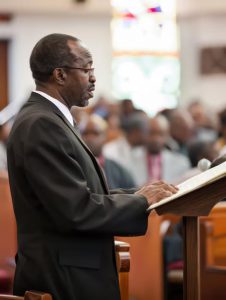“Be still and know that I am God!” – Psalm 46:10
What does it mean for a preacher to stand before the people of God and say anything of importance about who God is, about God’s call upon our lives, or about God’s active work in the life of the world? How does a preacher know the Lord in a way that is faithful to who God is? Can there be confidence that a sermon is genuine, rather than a word that has been hijacked by the influences of a person, political party, or extreme ideology? These questions have been relevant in every generation. Yet, they take on greater importance for such a time as this.
 Preachers who step into the pulpit carry a tremendous weight and responsibility. We come into these spaces navigating both our own swirling thoughts and emotions as well as those within the individual lives of our listeners: “How is Lois’s recovery going? Is Jerry upset because I haven’t had a chance to visit him since his surgery? How will people react when they learn that I have been battling depression? The Browns haven’t been in worship for the last three weeks. Did that difficult sermon upset them? What word of hope can I offer when the world is on fire?” And the work of sermon writing is never completed until we open our mouths, audaciously proclaiming with hope, “Thus says the LORD.” But how does the preacher know that this is a genuine Word?
Preachers who step into the pulpit carry a tremendous weight and responsibility. We come into these spaces navigating both our own swirling thoughts and emotions as well as those within the individual lives of our listeners: “How is Lois’s recovery going? Is Jerry upset because I haven’t had a chance to visit him since his surgery? How will people react when they learn that I have been battling depression? The Browns haven’t been in worship for the last three weeks. Did that difficult sermon upset them? What word of hope can I offer when the world is on fire?” And the work of sermon writing is never completed until we open our mouths, audaciously proclaiming with hope, “Thus says the LORD.” But how does the preacher know that this is a genuine Word?
Humility Over Consumerism
Each Sunday, before I preach, I pray, “May the words of my mouth and the meditations of our hearts be acceptable in your sight, O Lord. Send forth your Holy Spirit, we humbly pray, upon our ears, hearts, and minds so that we might hear what it is that you have to say to your people.” This prayer is reorienting. It centers me, not on myself or my words alone, but in the living God who is at work through these words offered in obedience to the Living Word. And yet, that prayer is already at work earlier in the week.
The preaching life begins with humility. Preachers are not asked to offer ideas about who God is or to give a religious take on the current news of the day. We are entrusted with holy work that dares to speak of God—holy work that dares to speak of the Holy One who is living and active in the life of the world. In this work, we are not called to proclaim ourselves, which is symptomatic of our consumerist culture that thrives off metrics, clicks, and views. Rather, inspired by the witness of Paul, “We proclaim Jesus Christ as Lord and ourselves as your servants for Jesus’ sake” (2 Cor 4:5). Holding this within a spirit of humility fosters the capacity to quiet the voices that compete for our attention. Centering ourselves in prayer, we can join with the psalmist, dwelling in the word to meet the living Word: “Be still and know that I am God.” Under the guidance of the Holy Spirit, the preaching life has the capacity to move us from simply knowing God within the inner sanctuaries of our individual lives into the inter-connected temples of God’s people.
Apprenticing Scripture Over Mastering It
 Centered in humility, the preaching life continues with our apprenticeship to Scripture. One of the greatest temptations that preachers face is the belief that we can become masters of Scripture. This is a lie. We will never be masters of these texts. Yet, when we apprentice ourselves to the Scriptures, we are opened to the possibility that the living God will move through those ancient words to encounter us, speak to us, and move us beyond ourselves. Apprenticed to Scripture we can learn from our ancient brothers and sisters; we can cultivate a sense of what is important to God—the things that break God’s heart as well as the things that bring God delight. And in this apprenticeship, growing in grace and love, our faith is formed and found, not simply as our faith alone but a faith that is held within the firm grasp of Jesus’ faithfulness. In humble apprenticeship to Scripture, we learn more deeply the witness of Paul, “It is no longer I who live, but Christ who lives in me. And the life I now live in the flesh I live by the faithfulness of the Son of God, who loved me and gave himself for me” (Gal 2:20). This is the training that forms us in Christ Jesus, guiding the witness of preaching that is genuine, unassuming, open to correction, and conformed to Christ alone. Therein lies the challenge.
Centered in humility, the preaching life continues with our apprenticeship to Scripture. One of the greatest temptations that preachers face is the belief that we can become masters of Scripture. This is a lie. We will never be masters of these texts. Yet, when we apprentice ourselves to the Scriptures, we are opened to the possibility that the living God will move through those ancient words to encounter us, speak to us, and move us beyond ourselves. Apprenticed to Scripture we can learn from our ancient brothers and sisters; we can cultivate a sense of what is important to God—the things that break God’s heart as well as the things that bring God delight. And in this apprenticeship, growing in grace and love, our faith is formed and found, not simply as our faith alone but a faith that is held within the firm grasp of Jesus’ faithfulness. In humble apprenticeship to Scripture, we learn more deeply the witness of Paul, “It is no longer I who live, but Christ who lives in me. And the life I now live in the flesh I live by the faithfulness of the Son of God, who loved me and gave himself for me” (Gal 2:20). This is the training that forms us in Christ Jesus, guiding the witness of preaching that is genuine, unassuming, open to correction, and conformed to Christ alone. Therein lies the challenge.
Integrity Over Excitement
Influenced by social media, it is enticing to offer a word from the pulpit that is entertaining, exciting, able to grab a congregation’s attention, and leave a lasting impact. Who hasn’t experienced a sermon that was well-crafted, seemingly relevant to the political or familial challenges currently experienced, makes you feel good, and concludes with a saccharine vision for living the best life God wants for us? Some days, this may be where God has led the preacher—especially if a hard word has been offered the previous week. But when this witness becomes the norm, when the focus is merely on making a congregation feel good, then something is missing.
Absolutely, the preacher should have an awareness of what is happening in the lives of the congregation to speak a Word of the Lord into the mess. Absolutely, the preacher should be aware of what is happening in the larger world rather than living an oblivious existence. Both are vital. Nevertheless, the call to proclaim the Word of God is not about the glorification or praise of the preacher; it is not for the entertainment of the congregation; it is not for the support of an agenda affiliated with any political party or cause at the expense of the Kin-dom of God. At the core, preaching deals with the God revealed in and through Jesus.
Our Nation’s Deep Need for the Genuine
 Despite the growing number of “nones” and “dones” in the life of our country, research also shows that there is a deep hunger for the transcendent. What is the genuine word that will meet this hunger, offering sustenance for the tumult and chaos of the world? Clever turns of phrase and entertaining anecdotes that work well for “clicks” may provide a temporary boost, but leave a person starved for more. Could it be that the answer lies in proclamation that is genuine—tested against the Scriptures; proclamation that is born from humility and apprenticeship that trusts in the power and presence of the Holy Spirit to work through broken and feeble language to communicate something of God to those who hunger? Could it be that the pathway for preaching in a post-Christendom world is a return to the transcendent, the numinous with the invitation of the living Lord through the psalmist, “Be still and know that I am God?” And in this knowing, could it be that both preacher and listener might have an encounter with the Christ who is living and active, risen and reigning, who holds us gently in his grasp, conforming our lives to his?
Despite the growing number of “nones” and “dones” in the life of our country, research also shows that there is a deep hunger for the transcendent. What is the genuine word that will meet this hunger, offering sustenance for the tumult and chaos of the world? Clever turns of phrase and entertaining anecdotes that work well for “clicks” may provide a temporary boost, but leave a person starved for more. Could it be that the answer lies in proclamation that is genuine—tested against the Scriptures; proclamation that is born from humility and apprenticeship that trusts in the power and presence of the Holy Spirit to work through broken and feeble language to communicate something of God to those who hunger? Could it be that the pathway for preaching in a post-Christendom world is a return to the transcendent, the numinous with the invitation of the living Lord through the psalmist, “Be still and know that I am God?” And in this knowing, could it be that both preacher and listener might have an encounter with the Christ who is living and active, risen and reigning, who holds us gently in his grasp, conforming our lives to his?

 The Rev. Tom Moore ’07/’10 is pastor of Center Presbyterian Church (McMurray, Pa.). He has pastored a number of congregations within the Pittsburgh Presbytery and served two years as interim executive director of Crestfield Camp and Conference Center. He holds a B.A. in religion from Westminster College and an M.Div. and S.T.M. from Pittsburgh Theological Seminary. Tom lives in Bethel Park with his wife, Amy, and their yellow lab, Buddy.
The Rev. Tom Moore ’07/’10 is pastor of Center Presbyterian Church (McMurray, Pa.). He has pastored a number of congregations within the Pittsburgh Presbytery and served two years as interim executive director of Crestfield Camp and Conference Center. He holds a B.A. in religion from Westminster College and an M.Div. and S.T.M. from Pittsburgh Theological Seminary. Tom lives in Bethel Park with his wife, Amy, and their yellow lab, Buddy.



1 thought on “Am I Preaching a Genuine Word?”